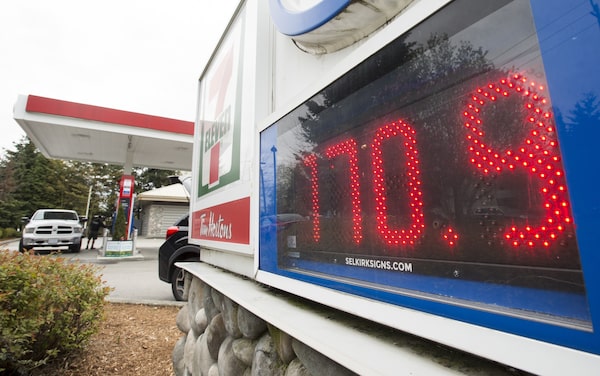
The marketing margin – the difference between the wholesale price and the retail price before taxes – was higher in Vancouver, where it averaged 10.5 cents a litre in April.JONATHAN HAYWARD/The Canadian Press
Vancouver drivers, already paying the highest prices for fuel in the country, should brace for another jolt at the pumps ahead of this May long weekend.
The unique conditions that have driven up prices in recent weeks in the Lower Mainland and on southern Vancouver Island are expected to be exacerbated as the summer driving season typically begins on the Victoria Day long weekend.
A new report from the National Energy Board (NEB) shows gasoline prices in Vancouver eclipse all other markets in Canada. The gap is growing, in large measure because it is the region with the tightest supply.
Now, demand is just about to increase, with no relief in sight.
“Each market has its own dynamic at play,” Jean-Denis Charlebois, chief economist at the NEB, said in an interview Tuesday. While most Canadians enjoy a flexible and reliable supply of gasoline, the NEB report found, the dynamic of the Vancouver market is squeezing drivers at nearly every turn.
The refining margin – the difference between what a refinery pays for crude and what it can charge for fuels and other products – averaged 52.1 cents a litre in Vancouver, double the national average, in April.
The marketing margin – the difference between the wholesale price and the retail price before taxes – was also higher in Vancouver, where it averaged 10.5 cents a litre in April. That’s about 70 per cent higher than the Canadian average.
And the taxes paid to the federal, provincial and municipal governments are the highest in the country, adding up to 53.9 cents a litre, which is roughly 20 per cent higher than the Canadian average tax.
(The balance of the price of a litre of gas accounts for the cost of crude oil, which is slightly lower than average.)
The B.C. government last week ordered its provincial energy regulator to investigate why gasoline prices have spiked in some parts of the province.
B.C. Premier John Horgan, who has pledged to make life more affordable for British Columbians, is under fire from Alberta Premier Jason Kenney, who says the BC NDP government is to blame for high prices at the pumps.
The Alberta government says B.C.'s opposition to the expansion of the Trans Mountain pipeline is only making matters worse.
But Mr. Charlebois said expanding the pipeline may not lower fuel prices for British Columbians.
The expansion, if built, would increase the pipeline’s capacity to deliver gasoline to the Lower Mainland, he said. But it would also allow Canadian producers greater access to world markets for their oil, which could push domestic prices higher.
“There are two forces going in the opposite direction,” he said. "How it will net out, we’re not sure yet.”
British Columbians consumed 96,000 barrels a day of gasoline last year and most of it arrived through the Trans Mountain pipeline, the NEB reports in its latest market snapshot. That includes 28,000 barrels a day of refined petroleum products, as well as about 50,000 barrels a day of crude oil to the Parkland Refinery in Burnaby.
The pipeline has been running at or near capacity for more than a decade, and in that time, the share of refined products being shipped through the pipeline has decreased. The NEB says it cannot give priority to any type of shipment – heavy crude oil, light crude oil or refined petroleum products. But the allocation of space in the pipeline can be amended through regulation.
Mr. Horgan has also asked Ottawa to help by directing the NEB to deliver more refined fuel through the Trans Mountain pipeline to improve supply in the tightest markets.
Mr. Charlebois said that could only be done if government – provincial or federal – made a formal application to the NEB to change the allocations. "At this time, we do not have such an application in front of us.”
Bruce Ralston, B.C.'s lead minister on gas prices, said his government has asked Ottawa to intervene and remains hopeful that will happen. “We are waiting for the Prime Minister to get back to us,” he said in an interview. “Time is of the essence, people are frustrated with the high prices and we are expecting quick action.”
 Justine Hunter
Justine Hunter